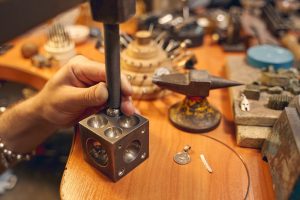Pawnshops offer quick cash solutions for those in need. They provide a unique service by allowing people to pawn or sell their items, from jewelry to electronics. This option is handy when you need money fast without the hassle of traditional loans. Many folks are unaware of the benefits pawnshops offer, like fair valuations and no credit checks when pawning goods. You can turn your unwanted items into cash quickly while keeping your financial options open.
In this listicle, we’ll highlight the top pawnshops that stand out for their reliability, customer service, and competitive rates. Get ready to discover which ones are worth your time and hard-earned cash. Scroll down for reviews of our top picks!
Key Takeaways

-
Understand pricing strategies by researching similar items online to ensure you get a fair deal when buying or selling at a pawnshop.
-
Look for hidden gems by visiting pawnshops regularly and asking staff about unique items that may not be on display.
-
Use negotiation tips by starting with a lower offer and being prepared to walk away if the price doesn’t meet your budget.
-
Familiarize yourself with insider loan terms to make informed decisions about borrowing against your items.
-
Always perform authenticity checks on items, especially jewelry and collectibles, to avoid purchasing fakes.
-
Keep resale value in mind; choose items that have a good track record of selling well in the market for potential profit.
1. Pricing Strategies Revealed
Pawnshops use various pricing strategies to stay competitive in the market. They analyze market trends to determine fair prices for goods. This involves looking at recent sales data and comparing similar items across different shops.
The condition and rarity of items play a crucial role in pricing. For instance, a piece of jewelry in excellent condition will fetch a higher price than the same piece with noticeable wear. Rare items, like unique artwork or vintage collectibles, often command premium prices due to their scarcity.
Customer demand significantly influences pricing as well. During certain seasons, such as holidays, pawnshops may increase prices on popular items like electronics or jewelry. Conversely, when demand drops, they might reduce prices to attract buyers.
Options for payment also affect pricing strategies. Shops that accept cash often have more flexibility in negotiating prices compared to those that only take cards. This can lead to better deals for customers looking to buy or sell.
Understanding these factors helps both buyers and sellers navigate the pawnshop landscape effectively. With plenty of options available, knowing the worth of your item can significantly impact the transaction outcome.
2. Hidden Gem Selection Tactics
Pawnshops offer unique opportunities for finding rare collector items. Scouting local markets and estate sales can uncover undervalued treasures. Items like vintage Magic the Gathering cards or hunting gear often go unnoticed. These collectibles can be resold for a significant profit.
Building relationships with other collectors is crucial. Networking allows access to exclusive deals and insider knowledge on sought-after items. Engaging in local collector groups or online forums can lead to valuable connections. These relationships may help you find loose diamonds or gold pieces before they hit the mainstream market.
Utilizing online platforms enhances your search for trending collectibles. Websites like eBay and specialized auction sites showcase what’s hot in the collectible world. Tracking sales trends helps determine which items, such as specific games or collections, are gaining popularity. For instance, a surge in interest for vintage board games could signal a profitable investment opportunity.
Consider the potential of diamonds and gold in pawnshops. They often sell at lower prices compared to retail stores. Knowing how to assess these items is vital. Understanding the quality and market value can lead to wise purchases.
3. Negotiation Tips Exposed
In a pawnshop, negotiating effectively can lead to easy cash and great deals. Preparation is key. Research item values before entering negotiations. Knowing the worth of items like trading cards, camping gear, or even tents can give you a solid foundation for bargaining.
Silence can be a powerful tool in negotiations. When you express your offer, remain silent afterward. This strategy often encourages sellers to lower their prices, as they may feel pressured to fill the awkward silence with a counteroffer.
Be willing to walk away from a deal if it doesn’t meet your expectations. This tactic shows the pawn broker that you are serious about your budget and can strengthen your negotiating position. Many successful negotiators have found that simply walking out can prompt sellers to reconsider their offers.
Consider these quick money ideas when visiting a pawnshop:
-
Know Your Items: Research current market values.
-
Use Silence: Create pressure during negotiations.
-
Walk Away: Strengthen your position by showing you are not desperate.
These tips will help you navigate the pawnshop environment more effectively. Whether you’re looking to buy or sell, mastering negotiation techniques can lead to better outcomes in your transactions.
4. Insider Loan Terms Unveiled
Pawn shop loans offer a unique way to access fast cash without the lengthy approval process typical of banks. These loans are secured by collateral, usually personal items like jewelry or electronics.
The loan-to-value ratio (LTV) is crucial. Most pawn shops offer around 25% to 60% of an item’s value. For instance, if you bring in a piece worth $1,000, you might receive between $250 and $600 in a loan. This ratio ensures that the shop can recover its costs if the borrower defaults.
Interest rates vary widely but generally range from 5% to 25% per month. Some shops may charge additional fees for storage or insurance on the items pawned. It’s essential to read the fine print to avoid surprises.
Repayment timelines for pawn shop loans are typically short, often lasting 30 days. Borrowers have the option to extend this period, but doing so can increase interest and fees significantly. Quick cash options like these can be beneficial for those needing immediate funds, but they require careful consideration.
Understanding the terms helps borrowers make informed decisions. Knowing what your items are worth and how pawn shop loans work can lead to better financial outcomes. Always ask about hidden fees before signing any agreement to ensure you know exactly what you’re getting into.
5. Authenticity Checks Exposed
Pawnshops implement thorough verification processes for high-value items to ensure authenticity. This is crucial, especially when dealing with expensive jewelry and artwork. The legitimacy of these items directly affects their resale price.
Professional appraisers play a vital role in this process. They possess the expertise needed to evaluate items accurately. For instance, a certified gemologist can determine if a diamond is genuine or synthetic. Their assessments help pawnshops set competitive prices based on the item’s true value.
Staff education is another key factor in fighting counterfeits. Employees receive training on common signs of counterfeit products. This includes recognizing fake designer handbags or watches. By identifying these signs, pawnshops protect themselves from purchasing worthless items.
Statistics show that around 20% of luxury goods sold in secondary markets are counterfeit. This emphasizes the need for robust authenticity checks. Pawnshops that prioritize these checks build trust with their customers. They gain a reputation for reliability, which encourages repeat business.
In summary, pawnshops utilize detailed verification processes and professional appraisers to ensure authenticity. Educated staff further enhance these efforts by identifying counterfeit signs. These practices not only protect the business but also provide fair pricing for genuine items.
6. Resale Value Insights Uncovered
In the pawnshop industry, resale value plays a crucial role. Experienced pawnbrokers assess the market trends and past sales data to predict future values of items. This predictive analysis helps both sellers and buyers make informed decisions.
Certain pawnshops specialize in vintage goods, which often yield higher resale prices. Items like luxury watches and collector coins maintain their value over time. For instance, a Rolex watch can appreciate significantly if it is in good condition and has its original box and papers.
Popular trends in collectibles also influence resale values. Many pawn shops report that items like rare coins or limited-edition sneakers are among the best-selling items currently. This trend mirrors online marketplaces, such as Facebook Marketplace, where these items often sell quickly at competitive prices.
Condition matters greatly when evaluating resale potential. Pawnbrokers encourage sellers to bring items in excellent condition for a better sale price. Accessories and cars also have varying resale values depending on their state and provenance.
For those looking to sell, visiting several pawn shops can provide insights into what particular pawnshops prioritize. Collectors often find great items at small pawn shops that may not be available at larger chains. Understanding these dynamics can maximize profit margins during a sale.
7. Confidential Customer Stories Shared
Customers often share inspiring stories about their experiences at pawnshops. These anecdotes highlight how pawning unique items can lead to unexpected financial gains.
One example involves a woman who pawned her grandmother’s vintage jewelry. She needed quick cash for an emergency medical bill. The pawnshop appraised the jewelry at a higher value than she anticipated. This allowed her to cover the costs and later reclaim the items, preserving her family legacy.
Another case features a musician who brought in rare memorabilia from a famous concert. He faced mounting bills and needed immediate funds. The shop recognized the item’s value and offered him a loan that exceeded his expectations. This quick cash solution helped him stay afloat until he secured a new gig.
Many people find themselves in similar situations where pawning provides an essential financial lifeline. Statistics show that around 75% of customers return to reclaim their items after repaying their loans, showcasing the trust and reliability of pawnshops.
These stories illustrate the quick cash advantage of pawn loans. They offer a practical solution for those facing urgent financial needs while allowing individuals to leverage valuable possessions without losing them permanently.
8. Redemption Process Clarified
Reclaiming pawned items involves several clear steps. First, you must present the original receipt to the pawnshop. This receipt serves as proof of ownership and details the transaction. Without it, reclaiming your item can become complicated.
Next, check the time limits set by the pawnshop. Most shops allow a redemption period that typically ranges from 30 to 90 days. After this period, unclaimed items may be sold to recover the loan amount. It is crucial to be aware of these timelines to avoid losing your belongings.
Fees also play a significant role in the redemption process. Pawnshops often charge interest on loans, which accumulates daily. For instance, if you borrowed $100 with a 10% monthly interest rate, you would owe $110 at the end of the month if you redeemed it within that time frame. Understanding these fees helps you budget accordingly.
Keeping all documentation is essential. Receipts not only prove ownership but also provide critical details about the loan terms, including interest rates and due dates. Losing this paperwork can lead to delays or complications when attempting to reclaim your items.
9. Inventory Rotation Secrets Exposed
Pawnshop owners must monitor inventory turnover rates to optimize stock levels. High turnover means items sell quickly, while low turnover indicates overstocked goods. A healthy pawn shop maintains an average turnover rate of 60-80%. This metric helps store owners understand which items are popular and which are not.
Seasonal promotions play a crucial role in clearing out older inventory. Pawn shops can introduce sales during holidays or local events, enticing customers with special deals on pawned items like jewelry or gear. For instance, offering discounts on electronics during back-to-school season can attract buyers looking for affordable options.
Analyzing customer purchasing patterns is essential for informed restocking decisions. By tracking what items sell best, pawn shop owners can tailor their inventory to meet demand. For example, if jewelry consistently sells well, increasing the variety of pawn shop jewelry can boost profits. Conversely, if certain items remain unsold, it’s wise to consider reducing their price or removing them from the inventory altogether.
Specialized pawnshops often benefit from focusing on niche markets. Stores like the xtreme pawn shop cater to specific interests, such as musical instruments or collectibles. These shops can create a loyal customer base by understanding their clientele’s preferences.
10. Behind-the-Scenes Security Measures Revealed
Pawnshops utilize advanced surveillance systems to protect their inventory. Cameras monitor every corner of the store, ensuring no suspicious activities go unnoticed. These systems often include high-definition video recording and motion detection features. This technology helps capture evidence in case of theft.
Employee training plays a crucial role in theft prevention and loss mitigation. Staff members learn to recognize potential thieves and how to respond effectively. Training includes understanding customer behavior and identifying red flags. Employees also practice securing high-value items, like watches and firearms, which are prime targets for theft.
Secure storage is vital for protecting valuable merchandise. Pawnshops invest in strong safes and locked display cases. High-value items are often stored away from public view until needed. This minimizes the risk of theft while maximizing security.
In addition to these measures, pawnshops often conduct regular audits of their inventory. This ensures that everything is accounted for and helps identify any discrepancies quickly.
These behind-the-scenes security measures create a safe environment for both customers and employees. The combination of surveillance equipment, employee training, and secure storage makes pawnshops reliable places to buy or sell valuable stuff.
Closing Thoughts
Navigating the pawnshop world can be a game-changer for you. Understanding pricing strategies, hidden gems, and negotiation tactics gives you the upper hand. You’ve got the tools to make informed decisions, whether you’re buying or selling. Authenticity checks and resale value insights ensure you’re not just getting a good deal but a smart investment.
Now that you’re armed with insider knowledge, put it into action. Dive into your local pawnshops and explore what they offer. Don’t be shy to negotiate and ask questions. The more you engage, the better your experience will be. Go ahead, seize those opportunities, and turn your pawnshop visits into rewarding adventures!
Frequently Asked Questions
What should I know before visiting a pawnshop?
Understand the items you want to sell or buy. Research their market value and be prepared to negotiate. Familiarize yourself with the pawnshop’s policies for a smoother experience.
How do pawnshops determine item pricing?
Pawnshops assess the condition, demand, and resale potential of items. They often use industry standards and recent sales data to set fair prices.
What types of items can I pawn or sell?
Most pawnshops accept jewelry, electronics, musical instruments, tools, and collectibles. Always check with your local shop for specific accepted items.
Are pawnshop loans safe?
Yes, they are generally safe. Pawnshops operate under strict regulations. Ensure you understand the loan terms before proceeding.
How can I ensure my item is authentic?
Conduct thorough research on your item’s brand and characteristics. Ask for documentation or certificates if available. Trustworthy pawnshops will perform authenticity checks.
Can I negotiate prices at a pawnshop?
Absolutely! Negotiation is common in pawnshops. Be polite but assertive, and present your case based on research and comparable prices.
What happens if I can’t repay my loan?
If you can’t repay your loan, the pawnshop keeps your item as collateral. You lose ownership, but no further financial obligation exists beyond the loan amount.

